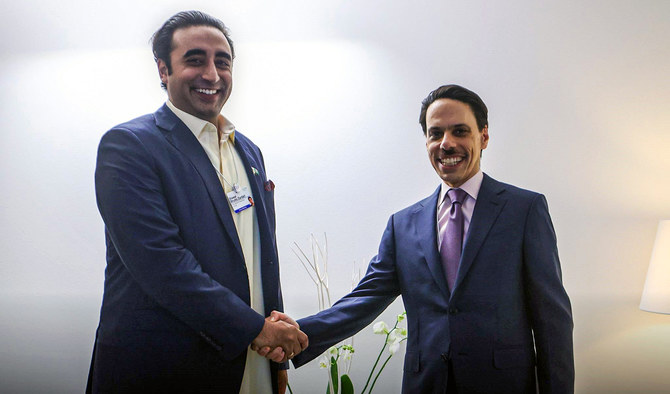ISLAMABAD: Pakistan‘s Foreign Minister Bilawal Bhutto-Zardari thanked his Saudi counterpart, Faisal bin Farhan Al-Saud on Friday for expressing solidarity with Pakistan and coming to its aid as it deals with the devastation brought about by floods.
Heavy monsoon rains have triggered flash floods in Pakistan’s southern provinces Sindh and Balochistan as well as in the country’s northwestern Khyber Pakhtunkhwa and in its South Punjab provinces. According to the National Disaster Management Authority (NDMA) over 1,200 people have been killed in rain-related incidents since mid-June.
Saudi Arabia, UAE, Turkey and other countries have sent relief items to Pakistan so that the South Asian country can cope with the heavy losses incurred by floods. On Friday, Bhutto-Zardari announced he had spoken to Al-Saud over the phone to thank Riyadh for its help.
“Had telephone call with @FaisalbinFarhan, briefed HH on the magnitude of devastation caused by floods & torrential monsoon rains in Pakistan,” the minister said in a tweet.
“Thanked the Kingdom for strong expression of solidarity and continued assistance for flood-affected people,” he added.
Last week, Saudi Arabia’s KSrelief sent 100 emergency relief trucks, carrying 950 tons of food items to 17 flood-ravaged districts of Pakistan. The consignment, the third from the aid agency since the monsoons began, included 10,000 food packages.
“More than 70,000 people will benefit from this emergency relief,” Saudi Ambassador Nawaf bin Said Al-Malki said at a ceremony in Islamabad last week before the goods were dispatched.
The Saudi international aid agency has implemented 2,069 projects globally worth almost $6 billion in 86 countries. Pakistan is one of the top five beneficiaries of the organization, with 149 projects worth $146.9 million executed since 2005.
Pakistan and Saudi Arabia enjoy cordial relations, with over 2.5 million Pakistanis living in the kingdom. Both countries also enjoy strong political, cultural and defence ties with one another, with Saudi Arabia often coming to Pakistan's help with economic aid.












